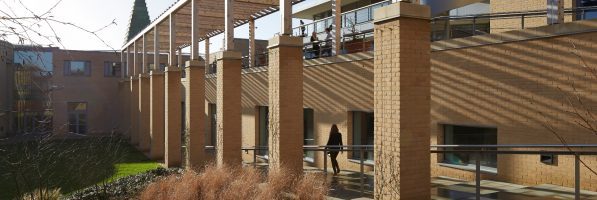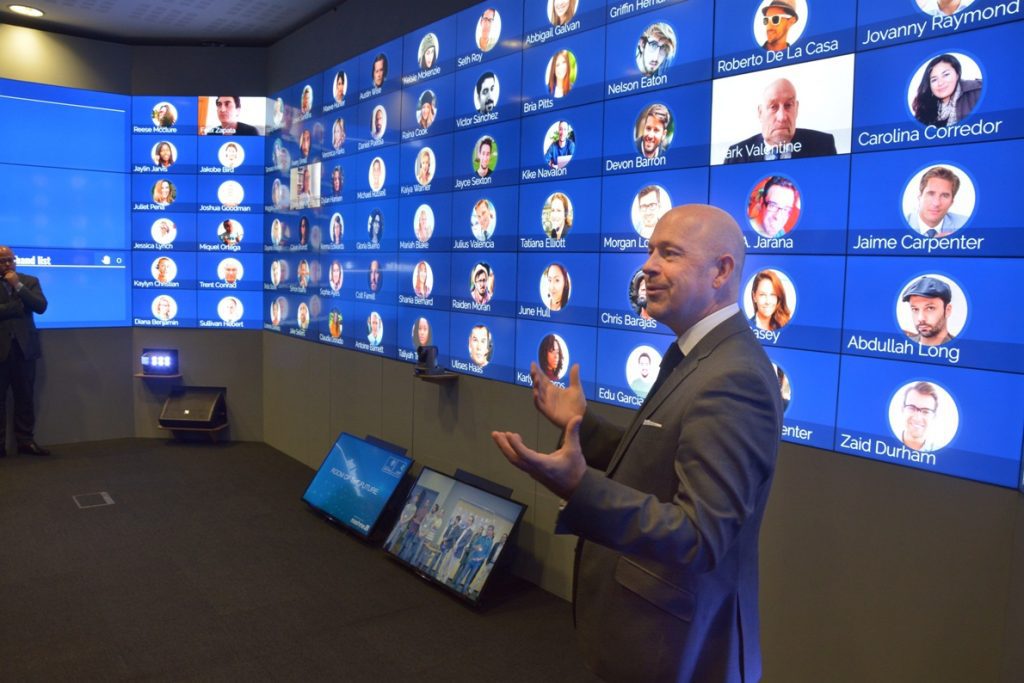Oxford Saïd MBA Students Suggests a Few 2018 Resolutions

The start of every year is a great time to reflect on what went well the previous year—and how you can improve in the next. Indeed, the time-honored tradition of setting resolutions for the new year can be especially valuable for MBA students and applicants. Whether you’ve just completed your first or third semester of an MBA program or are still working on perfecting your MBA applications, there are always a few resolutions that can help make the most of how ever much of your MBA experience is still ahead of you.
We’ve compiled a list of business school New Year’s resolutions from current MBA students at the University of Oxford Saïd Business School. While some are specific to Saïd’s program, they all represent great business school advice you’d do well to read regardless of whether you haven’t yet started or are closing in on graduation.
Business School New Year’s Resolution One: Balance Your Time
Whether you’re busily working on your applications, are about to start your first semester in an MBA program, or whether your final semester stretches out in front of you, learning how to balance your time is key to success in any MBA program. Marla Woodward (MBA ’18) explains how important it is to take care of all aspects of your life.
“To balance your time, pick an activity for your mind, an activity for your body, and an activity for your spirit,” Woodward wrote in a blog. “For example, this term I’m leading a project for the Oxford Strategy Group for my mind, I’m participating in fencing for my body, and I’m maintaining weekly family dog walks for my spirit.”
Containing the amount of time spent on schoolwork is also important. During your MBA, you’ll be presented with countless readings and assignments. Each class will load your schedule with things to do, and the best way to achieve success is to plan out how you’ll budget your time to get everything done for class while not overwhelming your life.
“Map out all readings, exams, and group projects in your calendar, so you know what’s coming when,” Woodward recommends. “This will help you anticipate how to budget your time when you have multiple group projects all due on the same day, and it will also come in handy when, heaven forbid, you can only find time for a portion of the readings and you need to decide which are the most valuable.”
Business School New Year’s Resolution Two: Take Advantage of Your Network of Classmates
This resolution is especially important for applicants who are preparing to start an MBA in 2018. Instead of thinking of it as entering a world of strangers, Bremen Leak (MBA ’18) advocates taking the attitude of poet W.B . Yeats who said, “There are no strangers, only friends you have not met yet.”
When Leak first started his studies at Oxford Saïd, it seemed like everything that could go wrong did. He was waitlisted. Then, once he was finally accepted, his housing fell through, and he was left without a place to live. But after starting school, he was offered a place to live by a classmate he had just met. And this was just the first of many times that he says a classmate helped him out.
“Since my first day inside the business school, I’ve watched my classmates—some 330 MBAs from 60 countries—band together to help one another succeed,” Leak wrote in a blog. “They’ve divvied up reading assignments and formed study groups and tutoring sessions. They’ve shared jokes, drinks, encouragement, and advice… Who were these people but strangers just a few months earlier?”
If it wasn’t for the fact that Leak had learned to treat his classmates like close friends, no matter how long [or short] their acquaintance, he could have missed out on many opportunities.
Business School New Year’s Resolution Three: Use Every Resource Available to You
From the moment you first start considering an MBA, there will be countless resources available to help you make the best decision. Here at Clear Admit, we offer dozens of articles each week containing the latest MBA news, advice from admissions teams, and interviews with current students. Of course, there are also the rankings from outfits like U.S. News & World Report, the Financial Times, Bloomberg Businessweek, and others to help you find the best program for you.
Perhaps most important of all are the resources provided by individual MBA programs themselves. There are the websites, of course, and the information sessions and the school fairs. But many applicants tell us that the most invaluable resources provided by the schools are the students themselves and everything you encounter on campus is a visit is in any way possible.
That’s what Nikhil Dugal (MBA ’18) discovered when he first started considering an MBA. In fact, the availability of resources was one of the main reasons he chose Oxford Saïd—in particular, the resource of the Skoll Centre for Social Entrepreneurship.
“Coming from a background in economics and math, I wanted to study business in a place that was focused on supporting social entrepreneurs and actively involved in the changing narrative on the nature of business. Due to this reason, I had a very specific list of MBA programs,” Dugal explained on a Skoll Centre blog. “Saïd Business School was at the top of this list, especially due to the countless resources they offer to social entrepreneurs and the presence of the Skoll Centre.”
Those resources helped Dugal receive the Skoll Scholarship, which provided him with the opportunity to pursue his goals without worrying about his finances. Since starting his MBA, there have been many other opportunities.
“Over the next year I plan to use all the resources we are offered here, including programs such as Map the System, Skoll Academy, and Skoll Venture Awards to refine the mission of my organization and explore levers for change to help us scale our impact,” Dugal wrote. “I’ve had the opportunity to attend a few sessions at the Skoll Academy already and am extremely impressed with the program the Centre has been able to put together as an alternative to the Consulting Development Program and the Finance Lab offered to the rest of the MBA class.”
With just a week into the New Year, there’s plenty of time to make good on your business school resolutions. What are you waiting for?
This article has been edited and republished with permissions from our sister site, Clear Admit.
New Partnerships Marry Business with Social Purpose at Oxford Saïd

Late last year the University of Oxford Saïd Business School partnered with the Global Thinkers Forum—a social purpose organization focused on accountable leadership, women’s empowerment, and youth development—to promote the annual Global Thinkers Forum Awards for Excellence. The event took place at the British Library on November 30, 2017, and celebrated recipients of the GTF Excellence in Global Leadership awards.
As part of its partnership, Oxford Saïd sent school delegates including Dr. Dina Dommet, director of student and program services; Dr. Marc Ventresca, associate professor of strategic management; and Amy Major, MBA recruitment manager. Many current MBA students, alumni, and university staff also attended.
“The work of the GTF is to build, recognize, and value global leaders in key fields—these are people who embody a breadth of vision to engage the challenges of our world and who bring a disciplined focus to support women’s leadership and new models of youth development, especially in the Middle East, the Gulf States, and Africa,” Ventresca said at an event underscoring the many deep ties between Oxford and Forum.
“GTF was incubated at Oxford, in the original academic work and action research of founder and CEO Elizabeth Filippouli,” he added in a statement. “Seven years on, it now encompasses a wide range of initiatives and partnerships in the United Kingdom and globally. The ties with the wider Oxford family are broad and deep, and each year go and grow in new directions.”
The Global Thinkers Forum brings together a diverse network of influencers and thought leaders from a wide variety of subjects and industries. Its goal is to encourage these leaders to share their visions of the future so they can effect positive change in the world around them. This year, the event’s theme was “The Trust Imperative in an Era of Uncertainty,” and one of the award recipients was Radha Basu. Basu works at iMerit.com, an AI and skill development agency in India and the United States. And during Hilary Term, he’ll be bringing his experience to Oxford Saïd as a guest lecturer.
“This event and the partnership with Global Thinkers Forum is one of the many ways our students can engage with and benefit from innovative work of our alumni,” Dommett said in the same press release.
Find out more about the recent event here.
This article has been edited and republished with permissions from our sister site, Clear Admit.
Meet Six MBA Scholarship Recipients at Oxford Saïd

At the Oxford University Saïd Business School, outstanding MBA candidates have the opportunity to earn the Pershing Square Foundation scholarship. This scholarship is awarded to future leaders who are in Saïd’s 1+1 MBA program, in which participants combine a specialized master’s degree with the school’s one-year MBA. Recipients of the award receive full tuition, college fees, and living expenses, plus a unique mentoring plan.
Peter Moores, Oxford Saïd dean and a professor of finance, talked about the scholarship in a recent news story calling it a “chance of a lifetime” for the recipients. “The Pershing Square Foundation’s gift will allow exceptional future leaders to gain deep knowledge and action-orientated business skills while being mentored by one of the most illustrious leaders in their fields,” he explained. “This customized, fully funded, two-year path eclipses all others. It’s simply a chance of a lifetime to help shape and develop amazing individuals who can go on to make an outstanding impact on the world.”
The six recipients for the 2017 year:
- Tim Krupa: Before attending Oxford Saïd, Krupa worked on the policy team for Canadian Prime Minister Justin Trudeau; he was an advisor on youth sport and disabilities policy. His experience also includes field work in Zambia in 2013, where he researched the determinants of well-being among Zambian children.
- Vuyane Mhlomi: From Cape Town, South Africa, Mhlomi is a former Rhodes Scholar and medical doctor. He also runs a non-profit organization, the MH Foundation, which uses education to cultivate Africa’s future leaders. Also, he’s the co-founder of the Emergent Healthcare Group (EHCG), a company that commissions affordable, accessible, and quality healthcare centers.
- Tulsi Parida: Before her MBA, Parida worked for Teach for America in the Bronx. She then joined Newsela, an education tech company, before relocating to India to oversee the growth of a mobile English learning app.
- Carl Rietschel: Out of Hamburg, Germany, Rietschel is a former Boston Consulting Group employee, where he worked on major government projects and clients within the financial industry.
- Giorgio Tarraf: Tarraf is the co-founder of Save Beirut Heritage (SBH), which started as a Facebook group and transformed into a large cultural organization with more than 10,000 volunteers. So far SBH has preserved more than 120 landmarks in the Lebanese capital. Tarraf has also joined the United Nations at the office of the under-secretary-general for global communications.
- Lauren Xie: Xie is a Harvard graduate with experience working for CSIRO Australia on a project focused on improving the incomes of 10,000 small farmers in eastern Indonesia. She has worked on a variety of complex issues including deforestation as well as indigenous peoples’ rights.
To apply for the Pershing Square Scholarship—for the September 2018 intake—the deadline is January 5, 2018. You can apply here.
This article has been edited and republished with permissions from our sister site, Clear Admit.
Oxford Saïd Launches New Virtual Hub

The Oxford Hub for International Virtual Education (HIVE) is the first of its kind in the United Kingdom and the second of its kind in the world. Located at the University of Oxford Saïd Business School, the new virtual classroom will use technology to connect students, faculty, and participants from around the world. It’s the latest development in the school’s digital agenda.
HIVE is a physical room with 27 high-definition screens shaped in a U. The technology—developed by SyncRTC and operated by the Mashme.io software—will allow up to 84 participants to engage with each other at one time. It’s far more advanced than traditional conferencing platforms. The software uses robotics along with facial recognition technology and 4D high-definition projections to create an immersive experience for both learners and teachers.
Oxford Saïd plans to use the HIVE in many ways, for everything from classes to pitching competitions. It will be especially useful for connecting faculty and students around the globe. Teachers will be able to address participants individually, split users into groups, conduct polls, and more. It’s a fully immersive experience that allows all participants to see and hear one another. Not only that, the software monitors the attentiveness of each individual and provides a score for them at the end based on their facial expressions and engagement with the class.

A look inside the Oxford HIVE
“While the Oxford experience is an integral part of our approach, the methods by which we teach and learn are changing,” Saïd Dean Peter Tufano said in a press release. “At Oxford Saïd we’ve been making decisive investments so we can learn about new pedagogies. The Oxford HIVE will allow us to teach, learn, and share ideas as a global community, and we see it as a crucial tool to unite our global community in support of our mission to tackle world scale challenges.” He added that it will also allow alumni to gather virtually as if they were on campus in Oxford.
“In a hive, bees work to make honey. At the Oxford HIVE, we will work to build knowledge,” Tufano said.
This article has been edited and republished with permissions from Clear Admit.
The Highest Paid MBA Starting Salaries in London

The draws of London may be too numerous to list: from a booming global economy to robust historic and cultural attractions, the city has a little something for everyone.
It’s likely no surprise that the city would take the sixth spot in The Atlantic‘s list of the “World’s Best Cities for Business, Life and Innovation.” While a number of factors were taken into consideration for creating the list, London’s ranking was likely boosted by its top spot in financial/business employment, and its 2nd overall spot in attracting job-creating foreign investment.
Such attributes make London an ideal spot for those pursuing or graduating with MBA degrees. As a center for global business, the opportunities for someone with the skills of an MBA are seemingly endless. However, the same vibrancy that attracts visitors across the world to London can make it an incredibly expensive city to live in from day-to-day, and those considering a move will need to consider both the cost of the city as well as earning potential.
Thankfully, London is home to some of the top MBA programs in the world, boosting the hireability and earning potential of graduates.
The Highest Paid London MBA Salaries
Saïd Business School – University of Oxford
Students at the Saïd Business School at the world-renowned University of Oxford take their education to countries around the world and into a wide variety of industries. Even considering the uncertainty brought to businesses in UK with the ‘Brexit’ referendum, the salaries of Oxford MBA graduates continue to rise from from the previous class to 2016 graduates. The average class salary for recent MBA grads at Saïd was £69,132, or $93,404 US—an increase of almost $13,000 from the previous year. These salaries varied slightly with industry, with salary averages for fields like finance and consulting reaching $96,273 and $98,458, respectively.
London Business School
With a staggering 96 percent of MBA graduates from London Business School accepting an offer within just three months of graduation, LBS graduates don’t need to wait long to start their dream job, with hopefully a salary to match. For MBA graduates of LBS, the average salary could range between £32,000 and £151,000, with the mean coming at an impressive £77,600. Salaries varied slightly between industries and also by region, with LBS graduates staying in the UK making slightly less than those venturing to North America.
READ MORE: “London Business School Launches More Flexible MBA”
Judge Business School—University of Cambridge
Graduates from the University of Cambridge Judge Business School will quickly realize the benefits of having such a well-regarded degree: about 92 percent of students from the graduating class received job offers within three months of earning their degree. The Cambridge MBA data also reveals the degree’s success in aiding those as they transition to a new career—98 percent of the 2015 graduating class switched either country, function, or industry sector just two years after graduating. The typical salary of Judge graduates increased greatly for the MBA class of 2015—likely a result of fluctuations in the pound after the Brexit decision—at a current average of £99,000, or, $133,792 USD.
Cass Business School—City University London
The Cass Business School at the City University London ranks among the top three schools for career development in the UK, a ranking reflected in the data of MBA graduates from the University. About 87 percent of MBA graduates reported a 53 percent increase in their salary. The average salary for MBA graduates at Cass is $99,000, with an even greater increase for those with an Executive MBA degree, at $130,000.
The Business of Art Meets the Art of Business: New Oxford Saïd Exhibition Explores Their Intersection

In an aim to initiate discussions on the relationship between business and the arts, the University of Oxford’s Saïd Business School will launch a fine art exhibition. The exhibition, curated by the Zuleika Gallery, will be held on September 13 and is open to all students, faculty, and the community.
The exhibit will feature a collection of British art from the 20th century to present day including avant-garde works from the St. Ives School, Pop Art, and pure abstraction. Many of the art works that will be presented are on loan from the Arts Council Collection, including pieces from pop artist Patrick Caulfield and abstract artist Wilhelmina Barns-Graham.
“I believe this exhibition perfectly reflects the ethos and values of Saïd Business School, and it acts as the visual equivalent of creative thinking, excellence, and innovation,” Lizzie Collins, Director or the Zuleika Gallery and curator of the exhibition, said in a news release.
The event will take place at the Saïd Business School and will also include a talk by Stephen Alvarez, an award-winning National Geographic photographer, filmmaker, and explorer. Alvarez has published more than a dozen feature stories in National Geographic on topics ranging from exploration and adventure to culture and archaeology. He is also the founder of the Ancient Art Archive, which is a non-profit foundation that uses photography and the newest image-based virtual reality (VR) technology to preserve and share the world’s oldest art.
Through the talk and the exhibit, Saïd plans to address the following topics:
- Why did we start making art?
- What can art tell us about today’s world of image-based social media?
- How can digital technology help us explore, share, and preserve our first stories?
This event is not the first time that Oxford Saïd has studied art and business. In October 2014, the university welcomed the Ashmolean Museum of Art and Archeology. It was a part of a series of activities put together by the business school and Oxford’s leading humanities scholars under the title, “Engaging with the Humanities.” In addition, the university is home to the Oxford Business Network for Art and Business, an extension of the alumni network seeking specifically to promote and exchange ideas surrounding the art industry.
To learn more about how the Saïd Business School looks at the intersection of art and business and to attend this free event, visit the Art at Saïd Business School event page.
This article has been edited and republished with permissions from Clear Admit.
